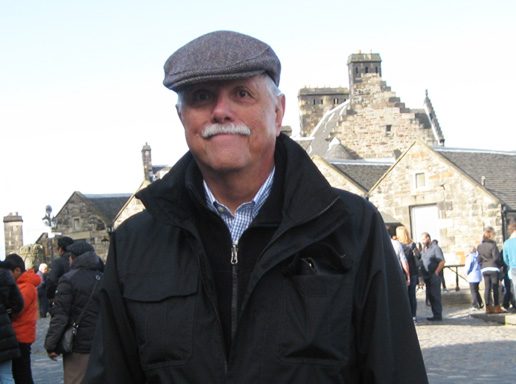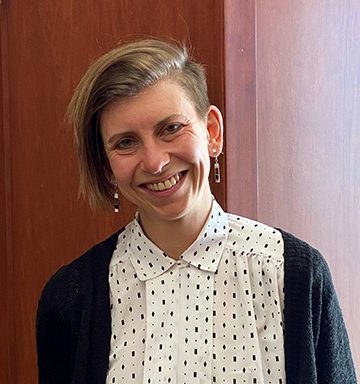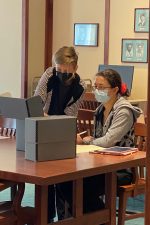This month we celebrate two SCA team members for being honored with 2021 Service Awards from the Arizona Library Association.

In a future update we will learn about the projects Rich has been a part of over his many years of volunteering in Special Collections and Archives. This time, however, we asked Sam Meier, Archivist for Discovery in SCA to tell us about an exciting collaboration she has been a part of this semester with Dr. Keleman Saxena. Below is her response.

Those who seldom journey to the archives tend to assume that Cline Library’s Special Collections and Archives (SCA) is full of dusty boxes of old documents and the old-school historians and genealogists who pore over them. In truth, researchers consult SCA’s archival collections for all kinds of projects, from searching for original footage to use in their documentary film to determining what kind of window to utilize as a replacement for a historically significant property.
Over the years, SCA has supported several scientific projects, including a 2014 partnership with the Southwest Experimental Garden Array (SEGA) using historic photographs and repeat photography to examine changes to plant life over time. This spring, I am delighted to support one of NAU’s first McAllister Climate Education, Engagement, and Design (CEED) Fellows, Dr. Alder Keleman Saxena, in a course which enables students to explore the environmental effects of human-built infrastructure on the Colorado Plateau using digitized archival materials available online via the Colorado Plateau Digital Collections.
Dr. Keleman Saxena and I began brainstorming the class that would become ANT 499: Climate Change and Infrastructure on the Colorado Plateau in fall 2019. We first met at the NAU New Faculty Orientation. She was new to Flagstaff, and she had recently completed her work on the digital humanities project Feral Atlas: The More-Than-Human Anthropocene with colleagues at Stanford University. As a born-and-raised Flagstaffian, the only thing I love more than sharing my hometown with new friends is talking about the amazing archival resources that we hold in Special Collections and Archives, which document the history of the place I have always considered home. Over mugs of coffee at Macy’s, we discussed the possibility of collaborating on a future class which addressed our mutual interest in humanistic explorations of climate change.
A whole pandemic year later, Dr. Keleman Saxena reached out to me again to see if I was still interested in her proposed course. I was. Together, we crafted a proposal for the McAllister Fellowship which proved to be successful. Dr. Keleman Saxena was awarded one of NAU’s first two McAllister CEED Fellowships in May 2021.
This spring, we have collaborated closely on designing the course and its final assignment, which will be digital projects built in Omeka examining different types of human-built infrastructure on the Plateau, such as roads and dams, and their relationships(s) to climate change. Through lectures and weekly assignments, students in the course have begun to acquire basic archival literacy skills such as how to search for and identify relevant primary source materials using Arizona Archives Online and the Colorado Plateau Digital Collections. I have supported the students in learning how to properly handle and consult archival materials on site in the Miriam Lemont Reading Room.

As the semester continues, the students will gain experience interpreting these physical and digitized historical materials within the framework of a ‘feral entity’: an event, process, or entity which emerges from “human-sponsored projects but are not in human control.” This work strengthens students’ research skills and hones their ability to critically analyze historic and contemporary aspects of the landscapes they encounter each day living, studying, and working in Flagstaff.
So far, topics identified by the students as possible themes for their final digital projects include:
- The construction of Glen Canyon Dam, the creation of Lake Powell, and their impacts on the Colorado River;
- The construction and maintenance of roads, particularly forest roads and roads built on tribal lands;
- The development of and subsequent legal battles over Snow Bowl ski resort;
Students have consulted and are continuing to study physical materials as well as digitized and born-digital materials from archival collections including the Katie Lee collection, the Fire on the Plateau collection (and related exhibit website), the Steve Dudley collection, the Grand Canyon River Guides collection, the Richard and Jean Wilson collection, the Arizona Trail Association records, and many more. We’re excited to see what they come up with for their final projects!